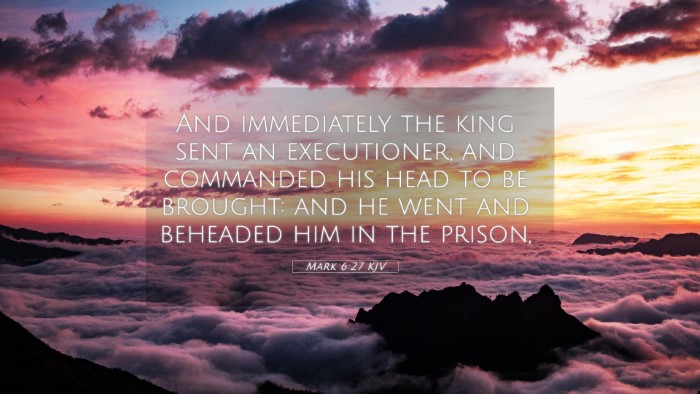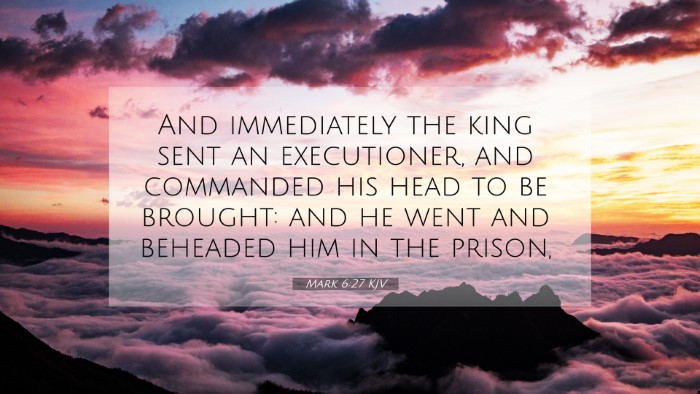Understanding Mark 6:27
Mark 6:27 reflects a significant moment in the narrative of John the Baptist's fate. The verse states: "And immediately the king sent an executioner with orders to bring John the Baptist's head. He went and beheaded him in the prison." This powerful verse encapsulates themes of authority, morality, and the cost of speaking the truth.
Key Themes and Interpretations
-
Authority and Fear:
In this verse, King Herod's authority is juxtaposed with his fear and guilt surrounding John the Baptist's rebuke of his immoral actions. Commentators, such as Matthew Henry, note that Herod's decision was driven not by righteousness but by societal and personal pressures.
-
Moral Responsibility:
Albert Barnes emphasizes the moral implications of Herod’s decision, highlighting how the king’s actions reveal the struggle between personal integrity and public image. Herod's willingness to kill an innocent man illustrates a significant biblical narrative of moral failure under pressure.
-
The Cost of Discipleship:
According to Adam Clarke, the fate of John the Baptist personifies the risks taken by those who stand for truth. His execution serves as a stark reminder that following God's call can lead to severe consequences, not only for the disciple but also for those who oppose divine truth.
Bible Verse Cross-References
Mark 6:27 connects profoundly with several other scriptures that delve into themes of authority, justice, and the cost of truth:
- Matthew 14:10: This passage parallels Mark 6:27 by recounting Herod’s execution of John, emphasizing the same themes of fear and moral corruption.
- Luke 9:9: Herod expresses confusion and guilt regarding John’s death, highlighting his inner turmoil encapsulated in a leadership role.
- John 3:30: John the Baptist's humility is showcased, emphasizing the contrast between his faithfulness and Herod’s actions.
- Matthew 5:10-12: These verses address the blessings given to those persecuted for righteousness, echoing John's plight.
- Acts 12:1-3: The subsequent executions of apostles by Herod amplify the narrative of persecution against God's messengers.
- Revelation 20:4: This verse offers a view of the ultimate vindication of those martyred for the faith, reinforcing the hope that persists despite earthly injustice.
- Romans 8:28: Reflecting on God working for the good amidst suffering can provide comfort to those facing persecution like John.
- Luke 14:27: The call to take up one’s cross highlights the necessary sacrifices involved in faithfully following Christ.
- 1 Peter 3:14: Encouragement to not fear those who persecute but to remain steadfast in truth aligns closely with John the Baptist’s fate.
- Matthew 10:28: Jesus speaks about fearing God over man, a principle John exemplified even unto death.
Cross-Referencing Biblical Texts
Cross-referencing Biblical texts like Mark 6:27 helps illuminate the multifaceted nature of scripture. Utilizing tools like a Bible concordance or Bible cross-reference guide can aid in identifying connections between Bible verses. Here are some techniques to enhance your understanding:
- Identify Themes: Look for recurring themes such as authority, justice, and morality across different books of the Bible.
- Search for Similar Characters: Characters facing persecution, such as John the Baptist and Jesus, can provide deeper insight into the nature of faith and sacrifice.
- Explore Historical Context: Understanding the historical and cultural backdrop of Herod’s reign can provide invaluable context for interpreting this moment.
- Utilize Bible Study Guides: Books and guides on comparative Bible verse analysis can facilitate deeper exploration of inter-Biblical dialogue.
- Engage with Community: Discussions with others about the implications of the verse enhance understanding through shared insights.
Conclusion
Mark 6:27 serves as a poignant reminder of the severe consequences of standing against corruption and the cost of discipleship for followers of Christ. As we explore connections between this verse and others, such as Matthew 14:10 and Luke 9:9, we gain a comprehensive understanding of the spiritual and moral narratives woven throughout the Bible. By engaging in cross-referencing, we uncover intricate relationships within scriptural texts that underscore the timeless relevance of God's Word.



